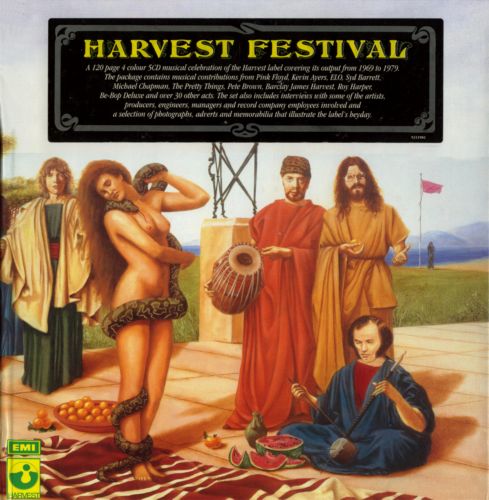

Harvest Festival is a genuinely comprehensive and thorough look at the one British major label venture into psychedelia and progressive rock that actually worked, commercially and artistically; it's a panoramic journey though a major part of British rock as it developed over a period of just under a decade. Over the five CDs and 119 songs, more than two dozen acts are featured, ranging from purely English phenomena like Michael Chapman, Quatermass, and Pete Brown to mega-arena acts like Pink Floyd, and the set comes complete with a built-in 120-page book that would be worth 35 dollars by itself. Beginning with the Edgar Broughton Band's Jimi Hendrix meets the Crazy World of Arthur Brown track "Evil," the programming goes a long way to explaining why Harvest worked while other attempts at forming psychedelic and progressive labels in England failed -- in contrast to the slick, commercial psychedelic ventures at rival Deram Records, Harvest always gave its artists the freedom to be louder (or softer) than the norm, and to be bold in their expressions. Moreover, the diversity of form was astonishing, from the acoustic instrumental chamber music rock of the Third Ear Band, to the lively acoustic psychedelia of Syd Barrett and Kevin Ayers, to the high-energy attack of Deep Purple, Quatermass, and Bakerloo -- it all sounds amazingly strong, well crafted, and exciting. Harvest had room for jugband music, traditional acoustic folk, progressive folk-rock, spoken word, and, full-circle commercially from Harvest's late-'60s origins, psychedelic Beatles-influenced commercial rock by way of ELO. Harvest also grew to embrace sounds that would have been inconceivable for EMI to have signed when they started, including Be-Bop Deluxe (versions 1 and 2), Bill Nelson's Red Noise, the reggae outfit Matumbi, the Shirts with Annie Golden, and the punk band Wire. It's all fascinating stuff, told in great detail in the accompanying book, but ultimately, a set like this stands or falls on the music. The archivists have dug deeply enough to find material that makes Barrett's output look tame and conventional, specifically Tea & Symphony, whose "Maybe My Mind (With Egg)" is a truly dissonant and strange journey into thought processes bent by the prism of drugs and meditation. Not everything on this set will be to everyone's liking, but anyone inclined to enjoy Pink Floyd or Syd Barrett's solo stuff will be entranced by most of the content. The sound has been treated first-class, with new state-of-the-art 1999 remasterings. The other measure of success of this box is that there's a huge amount of material here that leaves the listener wanting more from a lot of the acts featured.